The Best Sleep Aids for Insomnia
The term “insomnia” is often misused. Whenever we have a couple of nights with troubles in falling asleep, we blame it on insomnia. However, this can be a serious medical condition that’s not to be taken lightly. That’s precisely why this article will be focused on two main things: giving you a list of sleep aids for insomnia, but also providing you with more detailed information and what it means and what causes it.
You may want to read: Insomnia Statistics – A List Of 16 Eye Opening Stats
| Rank | Product | Highlights |
| #1 | 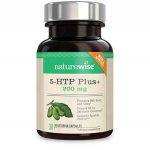 NatureWise 5-HTP Max Potency NatureWise 5-HTP Max Potency
|
|
| #2 | 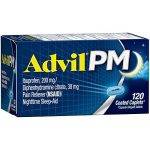 Advil PM Advil PM
|
|
| #3 | 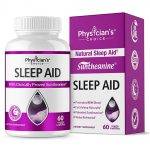 Sleep Aid with Valerian Root Sleep Aid with Valerian Root
|
|
| #4 | 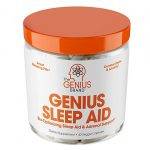 Genius Sleep AID Genius Sleep AID
|
|
| #5 | 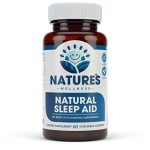 Nature’s Wellness Premium Sleep Aids for Adults Nature’s Wellness Premium Sleep Aids for Adults
|
|
| #6 | 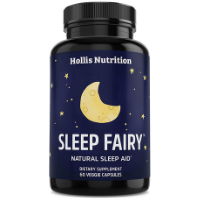 Sleep Fairy Natural Sleep Aid Sleep Fairy Natural Sleep Aid
|
|
What Causes Insomnia?
Insomnia can be the sign for many different medical conditions and quite varied ones at that. This is a two-faced coin, as in some cases, the medical condition is the one that causes insomnia, but it can also be the other way around. Some of the most common medical conditions that cause insomnia are sinus allergies, chronic pain, asthma, arthritis, gastrointestinal problems or even neurological conditions.
When you take meds for conditions such as heart disease, high blood pressure or asthma, you can also end up having insomnia. However, it is also the symptom of sleep disorders, such as the restless leg syndrome. Sleep apnea is also closely related to insomnia, as the person who suffers from it experiences obstructed air passages that lead to difficulties in breathing because of lower oxygen levels. Because these people have difficulty in breathing, they will end up waking frequently over the course of the night.
Depression

Insomnia has also been linked to depression. How many times have you felt overwhelmed by life’s problems that you couldn’t fall asleep in the middle of the night? Psychological burdens make it difficult for us to fall asleep, but they also change our moods for the worst. There’s a very dangerous cycle here, as the lack of sleep can lead to a hormone imbalance, leading to more psychological issues, leading to even more insomnia.
Anxiety
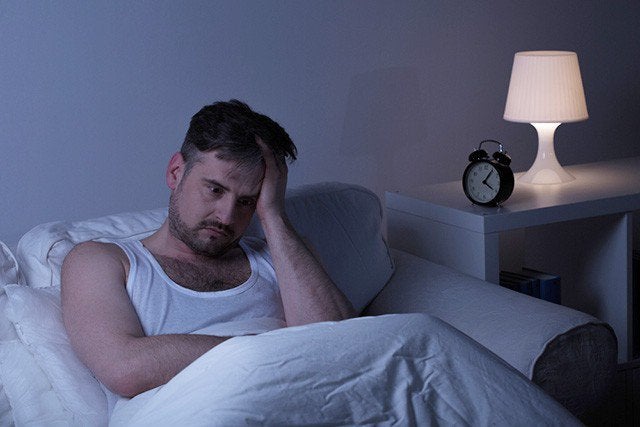
There is also a strong connection between insomnia and anxiety, which is an irrational fear that something may or may not occur. When you feel worried and nervous, your brain has a harder time relaxing, which prevents the secretion of melatonin, causing you to eventually lose sleep. Anxiety can either prevent a person from falling asleep or causes them to wake in the dead of the night and preventing them from going back to sleep. When this occurs for several nights in a row, our sleep-wake cycle is disrupted and could eventually cause one to feel anxiety even at the very thought of having to go to sleep.
Lifestyle

Insomnia can also be related to your current lifestyle choices. Our day-to-day behavior can cause disruption in our sleeping pattern. For example, freelancers who work from home and aren’t on a very strict working schedule can often be tempted to working during the night (yours truly is a very good example, I admit it), leaving them preoccupied with other nocturnal activities instead of sleeping. People who tend to take naps during the day are also more prone to suffer from insomnia, as it makes it difficult for them to fall asleep again at a decent hour in the night. People who work in shift and spend their night away from home are also a major category of people who are more exposed to the dangers of insomnia.
What can be a small episode at first, can turn out to be a big problem on the long run. For instance, if you are traversing a troublesome period in your life (e.g. a close relative passing away), you may have trouble sleeping the first few nights. It slowly becomes a habit, because picking up bad habits is literally the simplest thing in the world. Whenever you do manage to fall asleep, your subconscious is still working and start transmitting all your worries and negative thoughts into your dreams, basically turning them into nightmares. This, in turn, causes you to not want to fall asleep in the first place. This is just one example of how a vicious circle formed and we end up suffering from insomnia.
Diet

Last, but not least, the things we eat and drink can also cause disruptions in our sleeping schedule. Basically, there are four things that can influence your sleeping habits as far as food is concerned: heavy metals, nicotine, caffeine, and alcohol. Caffeine is a counterintuitive thing to mention here, as most of us already can’t function in the morning without it. The beauty of coffee is that it can actually keep you awake and focused when needed and is good for your health, as long as it’s natural and consumed in a decent daily dosage. But always keep in mind that caffeine is a stimulant and because we want to be fully functional throughout the day, we have the tendency of drinking way more than needed.
The amount of time it takes for caffeine to be eliminated from your system varies from person to person, but the process can take up to eight hours. Limiting your daily dose of coffee to one cup in the morning ought to do the trick.

What a lot of people don’t know is that nicotine is also a stimulant and smoking before bedtime can actually cause you to stay awake longer than needed. On the other hand, alcohol acts as a sedative, which means it can help you sleep faster. However, it is known to cause a disturbance in your sleeping pattern, which may cause you to wake up frequently during the night. Last, but not least, try to avoid heavy meals, especially prior to bedtime. As you are setting the tone for sleep, don’t redirect your body’s attention to digestion when it should be focused on melatonin secretion.
Best Sleep Aids for Insomnia Reviews
1. Editor’s Choice: NatureWise 5-HTP Max Potency
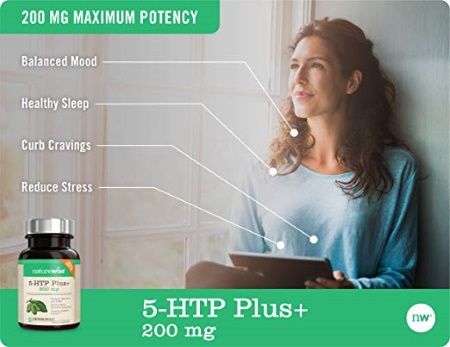
OVERVIEW
- Dimensions: 2.2 x 2.2 x 4 inches
- Weight: 2.1 ounces
- Sold As: bottle with 30 capsules
The idea behind creating a product such as the NatureWise 5-HTP Max Potency was that people experience high-stress levels because of their daily activities, they’re basically overwhelmed by fatigue and emotions and fail to find the means to relax. 5-HTP is developed from Griffonia plant seeds and pushes the body to create more serotonin. This neurotransmitter is responsible for regulating a lot of our body’s activities, from sleep to memory. Stress will often get in the way of our body’s natural serotonin production, which also decreases as we age. When the serotonin levels of our body are low, we may start experiencing anxiety and depression.
Some clinical trials revealed the fact that 5-HTP can also reduce caloric intake and suppress appetite, thus leading to weight loss. In addition to that, the formula also contains vitamin B6, which aids the body in converting 5-HTP to serotonin. Another important thing we want to mention is the company’s policy of testing their products with a third party tested. While this is not an FDA requirement, it’s the company’s way of saying they have full faith in the quality of their products. And speaking of quality, the product is also GMP compliant, which means that the entire manufacturing process (from raw ingredient harvesting to bottling) is in line with the industry standards for both quality and safety. Also, in most cases, it’s available on the shelf rather than over the counter.
Pros
- GMP compliant, meeting industry safety and quality standards.
- Contains 5-Hydroxytryptophan, which aids the production of serotonin.
- Can potentially help with weight loss.
- Reduces the effects caused by anxiety and depression.
Cons
- Is known to cause lucid dreams in some people.
2. Runner Up: Advil PM
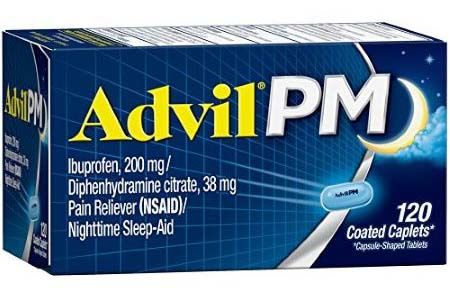
OVERVIEW
- Dimensions: 6 x 5 x 4 inches
- Weight: 5.1 ounces
- Sold As: bottle with 120 coated caplets
Advil has already made quite a name for itself, because of the mixture of ingredients that help people sleep faster, aids their pain and aids them in relaxing. That’s because it combines the number one ingredient for pain relief (ibuprofen) and one of the most common sleeping aid ingredients (Diphenhydramine). Whenever you have insomnia caused by pain and aches throughout your body, the two active ingredients of Advil can locate the source of the problem and help you get rid of whatever is keeping you awake. The best part of it all is that none of the ingredients in Advil is habit forming, which means that it’s safe to take these meds without having to worry about addiction.
Now let’s move on to some very important facts to consider before and while you’re taking Advil. Since the product also contains NSAID, it’s important to consider the hazard of stomach bleeding in some particular cases. The risk is severely increased if you are more than 60 years of age if you’re suffering from ulcer or other stomach-related problems, if you’re currently using steroids or any anticoagulant medication, or if you are currently on any other medication that contains prescription or nonprescription NSAIDs. It’s also advisable not to take Advil combined with any alcohol, to avoid taking it unless you have the next 12 hours ahead of you free, as it causes sleepiness. Also, avoid driving and operating heavy machinery and never take Advil on an empty stomach.
Pros
- One of the best OTC sleep aid options on the market.
- Contains ibuprofen, an ingredient known for its pain-relieving properties.
- Doesn’t contain any habit-forming ingredients.
- Can be purchased as either caplets or liquid gels.
Cons
- Has a lot of negative interactions (especially with alcohol and other forms of medication).
- Can cause stomach sleeping in a number of particular situations.
3. Best Natural: Sleep Aid with Valerian Root
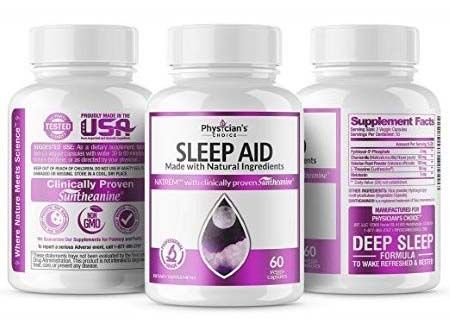
OVERVIEW
- Dimensions: 2.2 x 2.2 x 3.8 inches
- Weight: 2.4 ounces
- Sold As: bottled 60 capsules
If it’s veggie capsules you’re more interested in, here’s an option that might suit you. Based on Suntheanine, an amino acid that’s typically found in green tea and used to treat high blood pressure and anxiety, this particular sleep aids promotes the idea that in order for us to fall asleep faster, we need to wind down and help the body relax. Aside from Suntheanine, this sleep aid contains valerian root, which has been around for centuries and used in traditional medicine practices, melatonin – which is a natural substance produced by our bodies that help regulate our sleep-wake cycle., and even chamomile – a root that’s been consumed in the form of the tea for generations, to promote a state of calm and relaxation. The combination also contains Pyridoxal-5-phosphate, which the active form of the vitamin B6.
Pros
- Lowers anxiety due to the many soothing ingredients.
- Doesn’t cause dependency.
- Acts as a mild sedative that helps people fall asleep faster.
- Contains Suntheanine, which boosts GAMA levels in the body.
Cons
- Some people develop tolerance to the ingredients and tend to increase the dosage.
4. Best for Mood: Genius Sleep AID
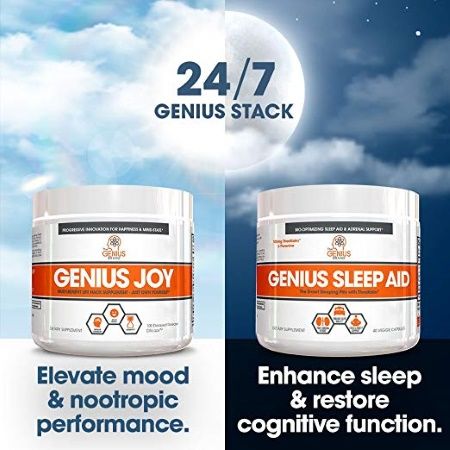
OVERVIEW
- Dimensions: N/A
- Weight: 3.2 ounces
- Sold As: bottle with 40 capsules
With thousands of people vouching for its effectiveness, the Genius Sleep Aid is yet another fruitful product that can help with short term insomnia. There are a lot of ingredients we already recognize in the mixture: melatonin, l-theanine, inositol, and others. It’s basically a combination of natural ingredients, amino acids, and vitamins that our body needs to promote a state of relaxations and send the right nighttime signals to our brain. Only by helping the brain relax can we truly unwind our bodies and get into the calm state that precedes sleep.
But here’s another thing that Genius Sleep Aid does: it can help reduce the level of caffeine in your body, which is often the source of your restlessness. That because it contains rutaecarpine, a herb that’s known for reducing the effects of caffeine and possibly promoting an early sleep schedule (assume you’re a coffee person, like most of us are). Genius Sleep Aid has made it its mission to reduce anxiety levels in our bodies and get the full benefits of this natural sleep aid, without having to worry about habit formation or potentially harmful side effects.
Pros
- Contains rutaecarpine, which is also known as the caffeine cleansing herb.
- Is made with natural ingredients, herbs, and amino acids.
- Doesn’t lead to any negative side effects.
- Isn’t a habit-forming kind of sleep aid.
Cons
- Melatonin dosage is a bit low.
5. Honorable Mention: Nature’s Wellness Premium Sleep Aids for Adults
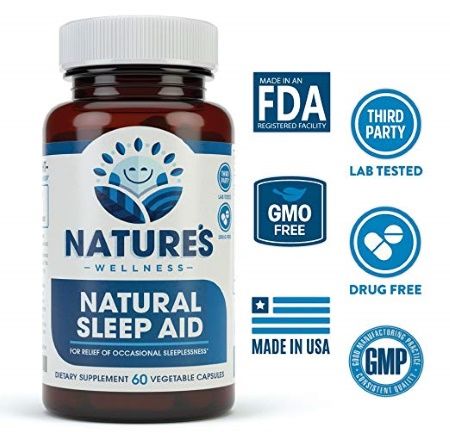
OVERVIEW
- Dimensions: N/A
- Weight: 0.3 ounces
- Sold As: bottle with 60 capsules
The last product on our list promises to be one of the best sleep aids for adults. It contains a mixture of the most natural sleep aids known to man: passion flower, valerian, chamomile, hops, and lemon balm. There’s also some melatonin in there because we already know that having a high melatonin level in your body sends signals to your brain that it’s time to get to bed. There are also some other fine choices of ingredients in these veggie capsules. There are L-Theanine, magnesium, and 5-HTP, making this product one of the most complete blends in aiding people with their insomnia-related problems.
Even more, Nature’s Wellness Premium Sleep Aid promises there won’t be any next-day grogginess, as none of the ingredients are too powerful. Because it’s made in a GMP-certified facility, it meets the industry safety and quality standards, which is a really important thing considering that there are so many sleep aids that are yet to have FDA approval. Always pay close attention to what you consume: some meds can do more harm than good.
Pros
- Contains a blend of the most common natural ingredients that are used in treating insomnia.
- Doesn’t cause addiction.
- Doesn’t cause any morning grogginess.
- Is made in a GMP-certified facility.
- Contains magnesium, which relaxes the muscles and tones down the heart rate.
Cons
- Acts as a mild sedative, rather than a pill that knocks you out instantly.
6. Also Consider: Sleep Fairy Natural Sleep Aid
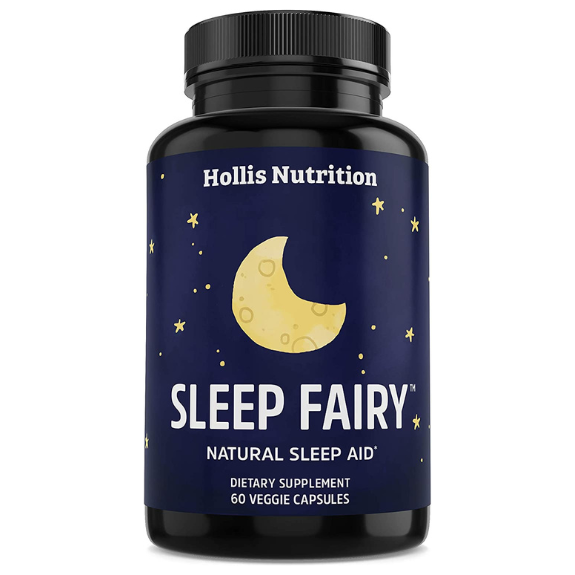
OVERVIEW
- Dimensions: 3.82 x 2.2 x 2.17 inches
- Weight: 2.89 Ounces
- Sold As: bottle with 60 capsules
Sleep Fairy is a dietary supplement for sleep that is non-addictive, mild, and created from all-natural, herb-based ingredients.
Developed by a neurologist utilizing only components that have been tried and true in the medical field. In addition to being non-GMO gluten-free, and vegan, it has also been tested and confirmed to be effective and safe.
It contains ingredients like chamomile flower and valerian root, all of which are recognized for their ability to calm and soothe. It also offers a boost of GABA (a neurotransmitter that is created naturally by the body) and 5-HTP (a supplement that comes from natural sources and has been associated with pleasant emotions). These two components work together to make you feel more relaxed.
Pros
- Vegan formula.
- Does not cause addiction.
- Safe and natural ingredients.
Cons
- It’s a hit and miss for some people.
You may want to read: How to Fall Asleep on VyVanse
The Bottom Line
Insomnia can be a long-term issue and a signal of much more significant health problems. When insomnia causes other health problems, you need to take the required measures to treat it. When other medical problems cause insomnia, treat them first. Whatever the case, it’s important not to overlook the long-term negative effects that insomnia has on your body and your lifestyle. While sleeping aid really is a helping hand, they’re merely a band-aid that you’ll eventually have to rip off.
In a high number of cases, people who are addicted to sleep aids have more of psychological addiction, as the body doesn’t really NEED sleep aids to sleep. Instead, we hang onto the idea that we can’t sleep without taking them and neglect the fact that our brain is actually much stronger than we can comprehend. As long as you remember to take sleeping aid for a period of maximum two to four weeks (depending on the manufacturer and your doctor’s indications), you should be able to successfully treat short-term insomnia.
